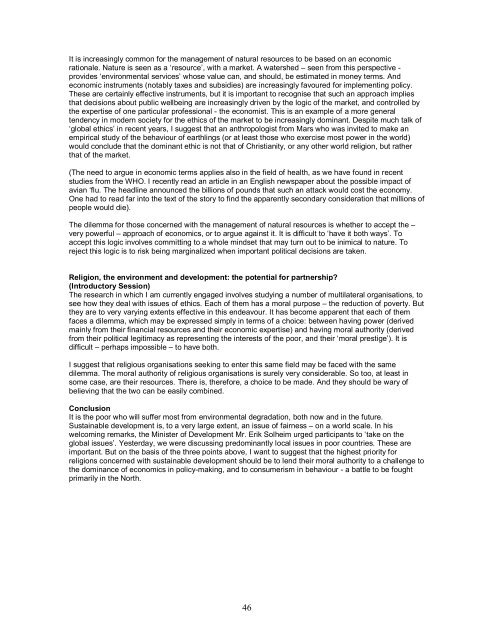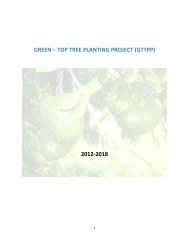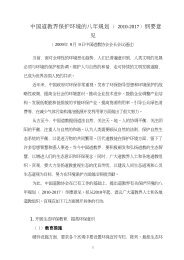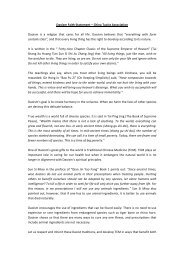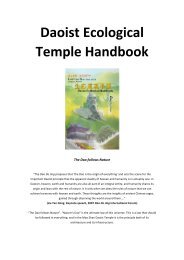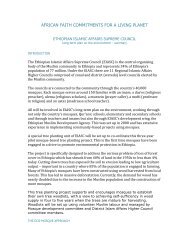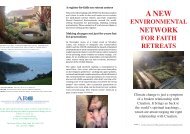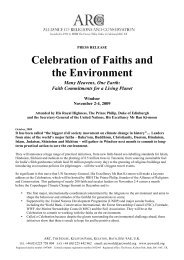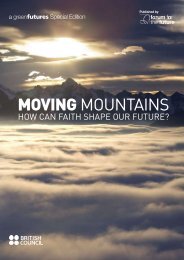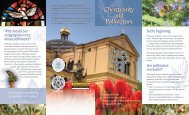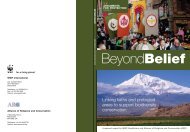summary paper - Alliance of Religions and Conservation
summary paper - Alliance of Religions and Conservation
summary paper - Alliance of Religions and Conservation
Create successful ePaper yourself
Turn your PDF publications into a flip-book with our unique Google optimized e-Paper software.
It is increasingly common for the management <strong>of</strong> natural resources to be based on an economic<br />
rationale. Nature is seen as a ‘resource’, with a market. A watershed – seen from this perspective <br />
provides ‘environmental services’ whose value can, <strong>and</strong> should, be estimated in money terms. And<br />
economic instruments (notably taxes <strong>and</strong> subsidies) are increasingly favoured for implementing policy.<br />
These are certainly effective instruments, but it is important to recognise that such an approach implies<br />
that decisions about public wellbeing are increasingly driven by the logic <strong>of</strong> the market, <strong>and</strong> controlled by<br />
the expertise <strong>of</strong> one particular pr<strong>of</strong>essional the economist. This is an example <strong>of</strong> a more general<br />
tendency in modern society for the ethics <strong>of</strong> the market to be increasingly dominant. Despite much talk <strong>of</strong><br />
‘global ethics’ in recent years, I suggest that an anthropologist from Mars who was invited to make an<br />
empirical study <strong>of</strong> the behaviour <strong>of</strong> earthlings (or at least those who exercise most power in the world)<br />
would conclude that the dominant ethic is not that <strong>of</strong> Christianity, or any other world religion, but rather<br />
that <strong>of</strong> the market.<br />
(The need to argue in economic terms applies also in the field <strong>of</strong> health, as we have found in recent<br />
studies from the WHO. I recently read an article in an English news<strong>paper</strong> about the possible impact <strong>of</strong><br />
avian ‘flu. The headline announced the billions <strong>of</strong> pounds that such an attack would cost the economy.<br />
One had to read far into the text <strong>of</strong> the story to find the apparently secondary consideration that millions <strong>of</strong><br />
people would die).<br />
The dilemma for those concerned with the management <strong>of</strong> natural resources is whether to accept the –<br />
very powerful – approach <strong>of</strong> economics, or to argue against it. It is difficult to ‘have it both ways’. To<br />
accept this logic involves committing to a whole mindset that may turn out to be inimical to nature. To<br />
reject this logic is to risk being marginalized when important political decisions are taken.<br />
Religion, the environment <strong>and</strong> development: the potential for partnership<br />
(Introductory Session)<br />
The research in which I am currently engaged involves studying a number <strong>of</strong> multilateral organisations, to<br />
see how they deal with issues <strong>of</strong> ethics. Each <strong>of</strong> them has a moral purpose – the reduction <strong>of</strong> poverty. But<br />
they are to very varying extents effective in this endeavour. It has become apparent that each <strong>of</strong> them<br />
faces a dilemma, which may be expressed simply in terms <strong>of</strong> a choice: between having power (derived<br />
mainly from their financial resources <strong>and</strong> their economic expertise) <strong>and</strong> having moral authority (derived<br />
from their political legitimacy as representing the interests <strong>of</strong> the poor, <strong>and</strong> their ‘moral prestige’). It is<br />
difficult – perhaps impossible – to have both.<br />
I suggest that religious organisations seeking to enter this same field may be faced with the same<br />
dilemma. The moral authority <strong>of</strong> religious organisations is surely very considerable. So too, at least in<br />
some case, are their resources. There is, therefore, a choice to be made. And they should be wary <strong>of</strong><br />
believing that the two can be easily combined.<br />
Conclusion<br />
It is the poor who will suffer most from environmental degradation, both now <strong>and</strong> in the future.<br />
Sustainable development is, to a very large extent, an issue <strong>of</strong> fairness – on a world scale. In his<br />
welcoming remarks, the Minister <strong>of</strong> Development Mr. Erik Solheim urged participants to ‘take on the<br />
global issues’. Yesterday, we were discussing predominantly local issues in poor countries. These are<br />
important. But on the basis <strong>of</strong> the three points above, I want to suggest that the highest priority for<br />
religions concerned with sustainable development should be to lend their moral authority to a challenge to<br />
the dominance <strong>of</strong> economics in policymaking, <strong>and</strong> to consumerism in behaviour a battle to be fought<br />
primarily in the North.<br />
46


